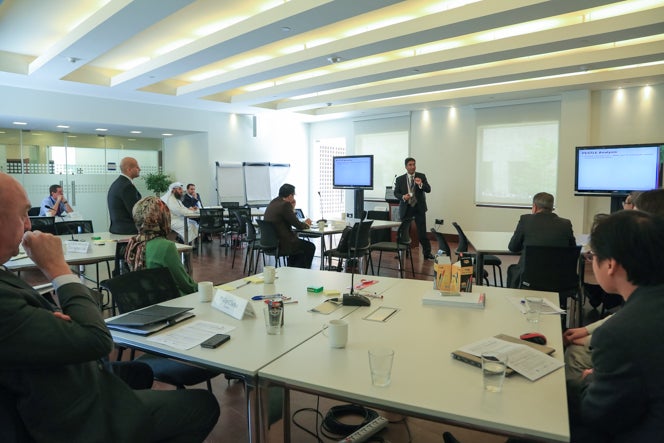Georgetown Workshops Discuss Food Waste Reduction in Qatar

Food distribution companies, supermarkets, hotels, restaurants, public officials, NGO’s and local consumers took part in two separate workshops held recently at Georgetown University in Qatar (GU-Q).
The workshops were part of the ‘Safeguarding Food and Environment in Qatar’ (SAFE-Q) project, which is a 3-year joint project (NPRP 7 – 1103 – 5 – 156) involving GU-Q, Cranfield and Brunel Universities in the UK and the University of Western Sydney. The project is being implemented through a research grant from Qatar National Research Fund (QNRF) and explores the issue of food waste in food distribution and consumption in Qatar.
Lead Principal Investigator for the project, Dr. Emel Aktas from Cranfield University, said that raising awareness about the amount of food that is discarded as well as developing solutions to reduce food waste, is one of the most important aims of SAFE-Q. “This project seeks to address a critical aspect of food security in Qatar and through the identification of possible food waste interventions can also be beneficial to other food constrained countries,” she said.
Both workshops provided an overview of the SAFE-Q project’s aims, envisioned outcomes and activities as well as discussed the challenges of food waste at global, regional and national level. The participants further worked in groups to discuss the causes of food waste. During the first day the focus was on waste occurring during the handling, distribution, transportation and storage of food whereas on the second day the local stakeholders primarily focused on the causes of food waste as a result of food preparation, cooking and consumption. As the participants analyzed inter-relationships and cause and effect linkages between these factors, consideration of the economic, legal, social, cultural and environmental constraints were taken into account.
GU-Q Assistant Professor of Economics, Zeynep Topaloglu, who is the Co-Lead Principal Investigator emphasized the longer-term context of the project: “Through developing policy recommendations to reduce food waste as well as ensuring the sustainability of the food supply chain within the context of food security in Qatar, this project will support the implementation of the Qatar National Vision 2030.”
Qatar imports over 90 percent of its food needs. Producing food domestically is highly challenging due to, among others, its hot weather, unfertile soil and lack of rain, which hinders agricultural production in the country, but also throughout the region. Reducing waste during distribution and consumption can contribute to improving Qatar’s food security situation.
Professor Zahir Irani, Dean of College, Business, Arts and Social Sciences at Brunel University and Principal Investigator, added “Food security is a global challenge and the research findings are scalable to have a significant impact beyond Qatar. This is thus an opportunity for Qatar to serve as a pioneer in understanding the issues around food security and around waste. If the results are applied globally, this can have an impact worldwide.”